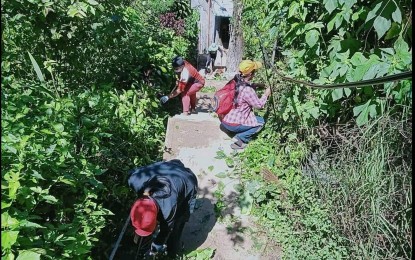
HEIGHTENED ALERT. Residents of Barangay Gibraltar, Baguio City help in the cleanup drive to eradicate dengue-carrying mosquitoes and breeding places in this 2022 photo. Cordillera Administrative Region is on heightened alert effective Aug. 1, 2024 due to the increasing number of dengue cases, which totaled 9,387 as of July 27. (Photo courtesy of Brgy. Gibraltar FB)
BAGUIO CITY – The Cordillera Regional Disaster Risk Reduction Management Council (CDRRMC) placed the whole region under blue or heightened alert effective Aug. 1 due to to increasing cases of dengue.
Citing the latest Department of Health (DOH) - Center for Health Development surveillance report, CRDRRMC Memorandum 93-2024 noted 728 additional cases on July 21 to 27.
To date, there are 9,387 total cases, with 19 deaths.
Of the total, 96 percent of the patients are from the Cordillera Administrative Region (CAR) while 4 percent are from other regions attended to in CAR hospitals.
The total cases to date rose by 166 percent from the 3,531 cases with five deaths during the same period last year.
Under blue alert, monitoring and warning, bio-surveillance, and preparedness for response, including the unified actions and measures against dengue and other mosquito-borne diseases, will be in place.
Provincial and municipal DRRM councils are required to submit regular preparedness measures and situation reports for consolidation and reporting to the national DRRMC.
The DOH-CAR has recommended cleaning of surroundings, especially after Super Typhoon Carina and the monsoon rains that caused accumulation of stagnant water.
Karen Lonogan, Development Management Officer IV and head of the Regional Epidemiology and Surveillance Unit, said in an interview Friday that it doesn’t matter whether the mosquitoes breeding in stagnant water causes dengue and other diseases or not.
“Ang importante ay mawala ang lamok (What is important is to eradicate the mosquitoes),” she said.
Lonogan also advised parents to have their children wear long sleeves and long pants or socks to prevent being bitten by mosquitoes while in school.(PNA)
